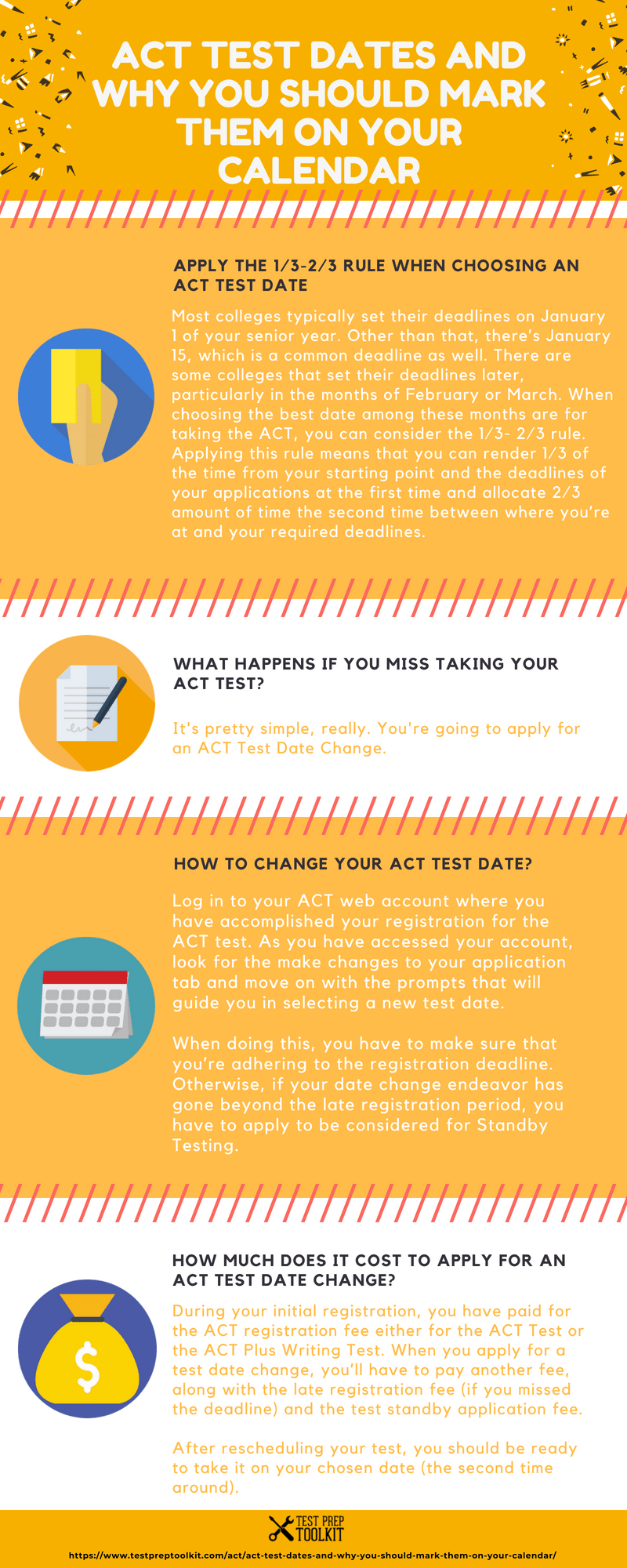You have to be in-the-know if you’re going to take the ACT test. You’d want to make sure that every prep and planning you do along the way makes sense. The key to acing the ACT test and getting admitted to the college of your choice is to prepare for it using effective study strategies and choosing the best date to take the test. Yes, studying is a significant part of taking the ACT, but so is effective ACT test prep and the proper calculation of your ACT test date. What is the best date to choose for your ACT test?
The answer to that question does not mean you pick the earliest date you can find. When selecting an ACT date, you have to verify when your college deadlines are. Like most of the students, you want to get a high score in the ACT to be able to gain admission to the college or university of your choice. At the same time, you might be wanting to avail of a scholarship. Knowing your deadlines for your college and scholarship applications are major factors when it comes to deciding on the best ACT test date for yourself.
- What Happens If You Miss Taking Your ACT Test?
- How To Change Your ACT Test Date?
- How Much Does It Cost To Apply For An ACT Test Date Change?
- Be Prepared The Next Time Around
Apply The 1/3-2/3 Rule When Choosing An ACT Test Date

Most colleges typically set their deadlines on January 1 of your senior year. Other than that, there’s January 15, which is a common deadline as well. There are some colleges that set their deadlines later, particularly in the months of February or March. Otherwise, if you’ve applied for early action or early decision, then your deadlines will probably be scheduled in November.
You’re bound to receive your ACT test score three weeks after taking the test. Thus, you ought to leave this much amount of time in between your test date and the first deadline that you should comply with. The ACT test is administered 6 times in a year, in the months of February, April, June, September, October, and December.
When choosing the best date among these months are for taking the ACT, you can consider the 1/3- 2/3 rule. Applying this rule means that you can render 1/3 of the time from your starting point and the deadlines of your applications at the first time and allocate 2/3 amount of time the second time between where you’re at and your required deadlines.
So, for instance, if your ACT test prep started in January of your junior year, you can decide to take the test in April. If you plan to retake the test, you can opt to make it in October. This is not to say that this rule suggests that you take the ACT test twice, but many students have considered taking it three times or more.
Related Topic: ACT Test Introduction, Registration, Dates & Score
What Happens If You Miss Taking Your ACT Test?
As you choose your ACT test date, you ought to make sure that you will actually be there to accomplish this undertaking. Mark your ACT test date on your calendar because you wouldn’t want to miss this significant day in your academic life. But what happens if you miss taking the ACT test by your designated date?
There are many reasons why you might miss taking your ACT test. On the night before the test, you might not have been able to sleep well, making you feel sick the next morning. You might wake up feeling feverish and plagued with various aches here and there. Another reason is that you might not have been able to implement an effective and sufficient ACT test prep regime. With such situations, you might decide to skip taking your ACT test and worry about it later even if you’ve already registered.
Related Topic: ACT Scores
How To Change Your ACT Test Date?
What you should do in this case is to access your online ACT account and request an ACT test date change.
When online, log in to your ACT web account where you have accomplished your registration for the ACT test. As you have accessed your account, look for the make changes to your application tab and move on with the prompts that will guide you in selecting a new test date.
When doing this, you have to make sure that you’re adhering to the registration deadline. Otherwise, if your date change endeavor has gone beyond the late registration period, you have to apply to be considered for Standby Testing.
Related Topic: ACT Registration and Requirements
How Much Does It Cost To Apply For An ACT Test Date Change?

During your initial registration, you have paid for the ACT registration fee either for the ACT Test or the ACT Plus Writing Test. When you apply for a test date change, you’ll have to pay another fee, along with the late registration fee (if you missed the deadline) and the test standby application fee.
Considering the substantial cost of an ACT test date change, it is much better to drag yourself out of bed and head to your testing center to take your ACT test on the original date that you have scheduled. You can see the complete ACT Test Dates here.
Issues may arise pertaining to your test date change process, nonetheless, so make sure you’ll know what to do. If you cannot push through with the online process of changing your ACT test date, you can call the ACT body at 319.337.1270 to facilitate the process. Give them your full name as it exactly appears on the ID that you will present during your test day, your address, a credit card and your choice of a test date and a test center.
Related Topic: ACT Practice Test
Be Prepared The Next Time Around
After rescheduling your test, you should be ready to take it on your chosen date (the second time around). If you were overwhelmed with first-time jitters, you should be better prepared the next time. Be ready to implement an effectual study regime and a test prep program. You can hire a tutor or do self-study with the help of a plethora of ACT test prep resources and practice tests online and in your local library.
Related Topics:
- 5 Reasons You Should Not Be Scared Of Taking The ACT Test
- 7 Items You Shouldn’t Bring During the ACT Test Day
- 3 Things You Need To Do On Actual ACT Test Date
- How To Apply For The ACT Test
- How Hard Is The ACT Test?


